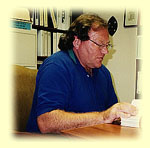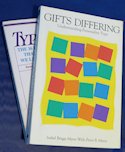
- About the MBTI
- Verify Your MBTI Type
- Personality Patterns
- MBTI Articles & Resources
- Article Directory for Educators & Students
- Books on Personality Types
- Emotional Intelligence & Personality Type
- Career Planning & MBTI
- MBTI Business Applications
- Lenore Thomson - Carl Jung Personality Type
- Site Map - Master Directory of All Articles
- MBTI Consultant Links
- Personality Type Workshops & Conferences
- Links to Other Type Websites
- Murder Mystery Business Theatre
- About Us
| 1 | 2 | 3 |
Articles on MBTI ® applications: The Cult of Personality ?
Glibly Attractive: Reading Annie Murphy Paul's "The Cult of Personality"
Peter Geyer, INTP - Warrnambool, Australia
Annie Murphy Paul: The Cult of Personality - How Personality Tests are leading us to miseducate our children, mismanage our companies and misunderstand ourselves. Free Press NY 2004 ISBN 0-7432-4356-0
Page 3 . . .
Some of the quotes are genuinely bewildering. The comment "a Jungian horoscope" refers to a paper by T.G. Carskadon (1982) that suggests the opposite, implying Paul actually hasn't read it. This paper is also presented erroneously in the endnotes as unpublished. Data on MBTI test-retest presented in the text is presented without reference anywhere.
Two final references are intriguing. The first is to the report In the Mind's Eye, a 1991 publication. This report actually supports the MBTI rather than what is claimed by Paul and others. But you have to read it closely in order to find that out.
The second is to the well–known Barnum Effect, which proposes that if you say something nice or positive to someone, they'll probably agree that it's an attribute, whether or not that's the case.
The author seeks to illustrate this by taking one sentence from various brief type descriptions (INFP, INFJ, ISFJ, INTJ, ISFP) provided on one page of the booklet Introduction to Type (1998). The statements, part of much longer statements, are selective and taken out of context. It also means that she ignores longer descriptions of each of the 16 MBTI types that commence just over the page, let alone going elsewhere for longer descriptions.
All 5 of the examples prefer introversion and four of the five examples prefer intuition or feeling. No attempt has been made to give a variety of descriptions, nor to go from this page (13) to the longer type descriptions that follow. As an INTP, I didn't feel inclined to agree with any of these statements; perhaps the author agreed with most of them in some way, and chose them because of that.
In my research on the MBTI, I've become aware that the depth of knowledge expressed, particularly in critiques, but whether as articles or in books is uneven to say the least. So a well-researched critique of personality testing in organisations and schools (including the MBTI) would have been welcome, from my point of view at least. Instead, there's just some more random accusations to wade through, and perhaps the issue here is self-promotion rather than the topic itself.
The final chapter, which presents the author's preferred method of looking at personality through life story is fairly incoherent in terms of point and direction. I was unable to ascertain the point of the exercise, or that this was in some way enlightening. The difficulties of this sort of narrative, or biography, have been well pointed out by Ludwig (1997). From an MBTI perspective, it was quite easy to work out that the person concerned, who was engaged in sailing around the world, was probably ISTP, but of course it could have been anyone from the author's point of view.
The issue of testing and associations with business and so on is an important issue, and should be discussed. The few decent examples provided and, from the MBTI perspective, Zichy's cameo, presents a number of problems in that respect; as far as I see it.
The critiquers of the various projective or objective tests are also accepted as being factual without argument, or broad references showing the topic has actually been researched in some depth.
As a consequence, this is an interim review. I've decided to search amongst what references are provided, because I can't ascertain whether the arguments presented are well founded or not.
I am extremely concerned at the lack of attention to detail and the poor editing of both quotes and chapter organisation from someone with claims to editing experience. Certainly the author doesn't seem to have much self-doubt; but you need more than a belief to be convincing as far as I'm concerned.
® MBTI, Myers-Briggs, Meyers Briggs, and Myers-Briggs Type Indicator are registered trademarks or trademarks of the Myers-Briggs Type Indicator Trust in the United States and other countries (aka meyers briggs or myers briggs).
Some References
Ash, Mitchell G, and Woodward, William R. (eds.) (1987) Psychology in Twentieth–Century Thought and Society Cambridge New York
Bair, Deirdre (2003) Jung: A Biography Little, Brown
Banta, Martha (1993) Taylored Lives: Narrative productions in the Age of Taylor, Veblen, and Ford Chicago
Bayne Rowan (1995) The Myers-–Briggs Type Indicator: A critical review and a practical guide Chapman & Hall London
Brooke, Jonatha (2004) Better after All (Jonatha Brooke Naughty Puppy Music ASCAP) from CD Back in The Circus Bad Dog Records B0001754-02
Carskadon, T.G, (1982) Myers-Briggs Type Indicator characterizations: A Jungian Horoscope? in Journal of Psychological Type, 5, 52.
Feder, Kenneth L. (1995) Frauds, Myths, and Mysteries: Science and Pseudoscience in Archaeology Mayfield Mountain View
Geyer, Peter (1995) Quantifying Jung: The Origin and Development of the Myers–-Briggs Type Indicator MSc Thesis University of Melbourne www.petergeyer.com.au
Gould, Stephen Jay (1996) The Mismeasure of Man Revised and Expanded Edition W.W. Norton New York
Hanson, F.Allan (1993) Testing Testing: Social Consequences of the examined Life University of California, Berkeley
Kanigel, Robert (1997) The One Best Way: Frederick Winslow Taylor and the Enigma of Efficiency Little, Brown London
Keirsey, David (1998) Please Understand Me II Prometheus Nemesis
Ludwig, Arnold M. (1997) How do we know who we are? A Biography of the Self Oxford New York
McGuire, William and Hull R.F.C. (1978) C.G.Jung Speaking: Interviews and Encounters Thames and Hudson London
Morawski, Jill G. (1988) The rise of experimentation in American Psychology Yale
Myers, Isabel Briggs (1998) Introduction to Type Sixth Edition CPP Palo Alto/ACER Melbourne
Myers, Isabel Briggs, with Myers, Peter Briggs (1991) Gifts Differing 10th Anniversary Edition CPP Palo Alto
Quenk, Naomi L. (1999) Essentials of Myers-–Briggs Type Indicator Assessment Wiley New York
Rogers, Tim B. 1994 The Psychological Testing Enterprise: An Introduction Brooks/Cole Pacific Grove
Saunders, Frances Wright (1991) Katharine and Isabel: Mother's Light, Daughter's Journey CPP Palo Alto
Sokal, Michael M. (ed.) (1990) Psychological Testing and American Society 1890-1930 Rutgers
 About Peter Geyer |
Peter Geyer offers a review of "The Cult of Personality" by Annie Murphy Paul, a former editor of "Psychology Today." Criticizing the tool rather than the tool users, Paul has painted with a broad brush protesting the use of personality testing, including lumping the MBTI among the medicine she believes society can do without. |
Peter Geyer is a teacher, writer, researcher and PhD student, currently studying the ideas, history and practicality of the MBTI at the University of South Australia. He conducts MBTI Qualifying Workshops and advanced seminars. He writes for the Australian Psychological Type Review and at www.petergeyer.com.au
| |
